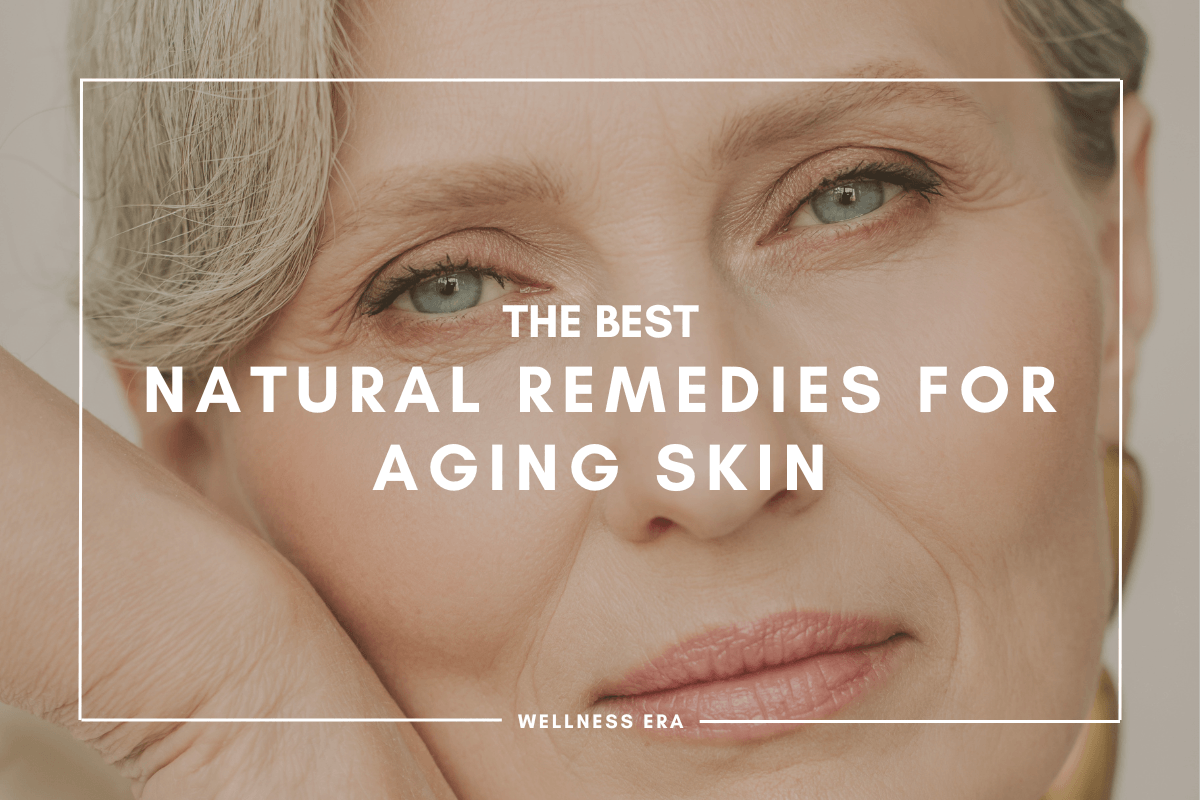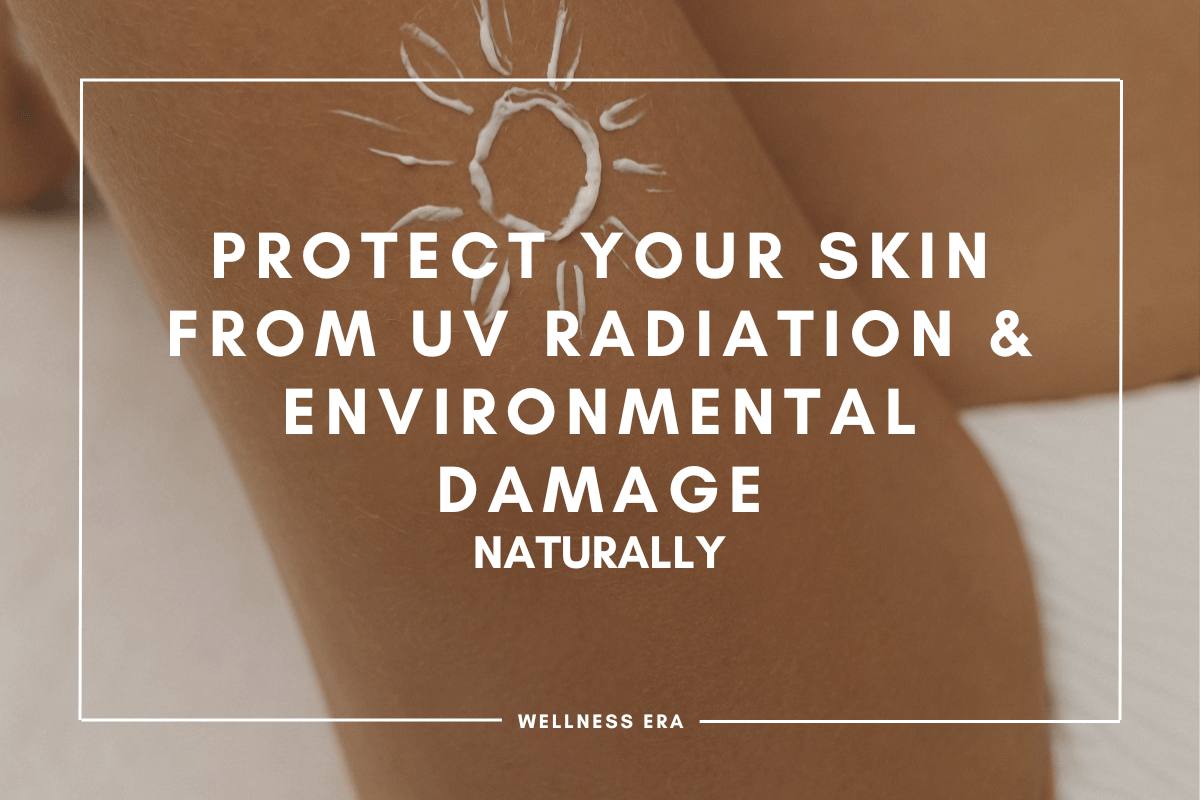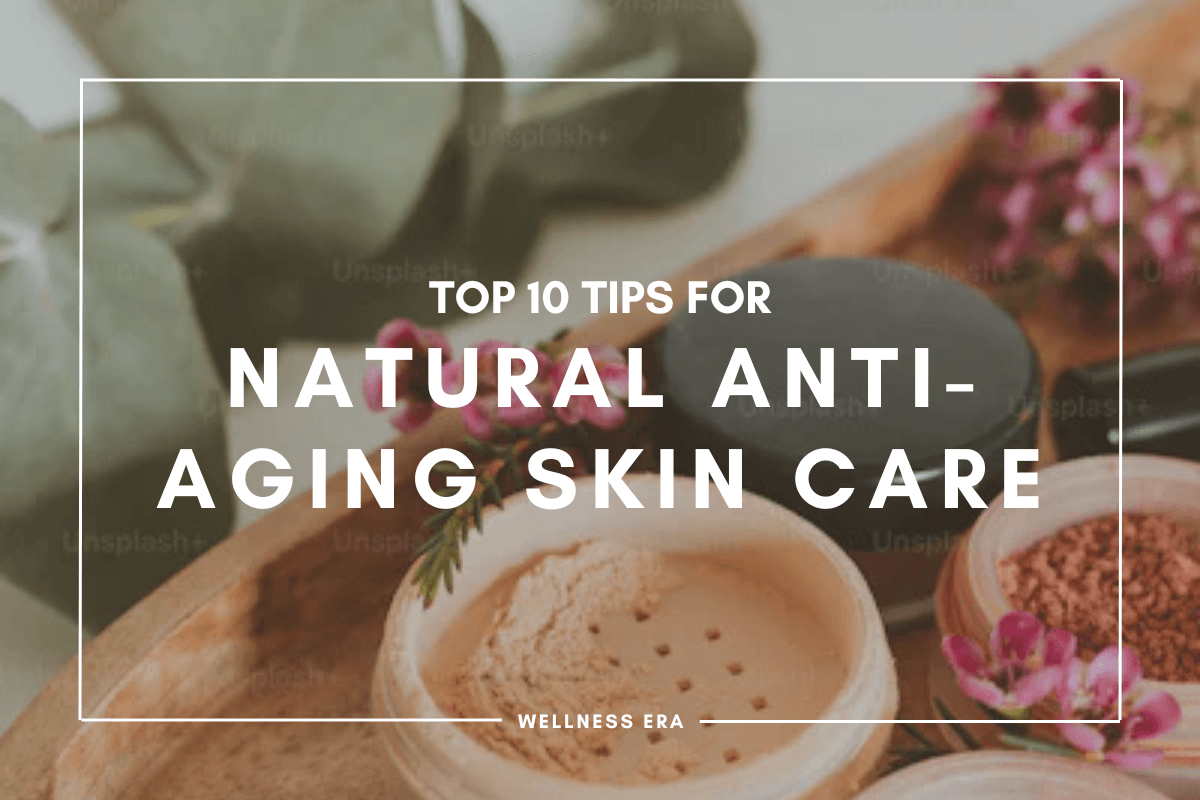Prevent Collagen and Elastin Breakdown: 7 Natural Remedies to Boost Collagen Production
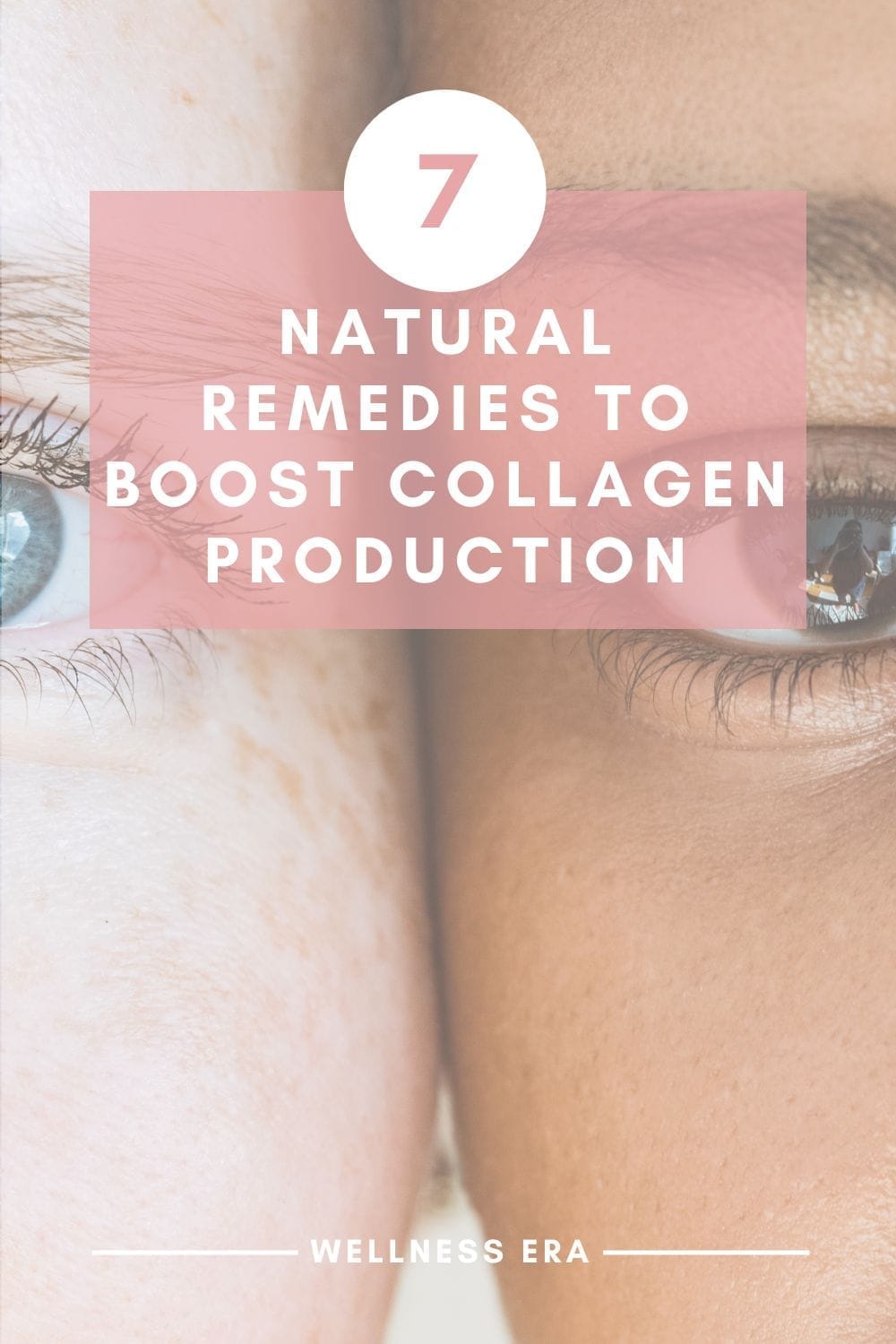
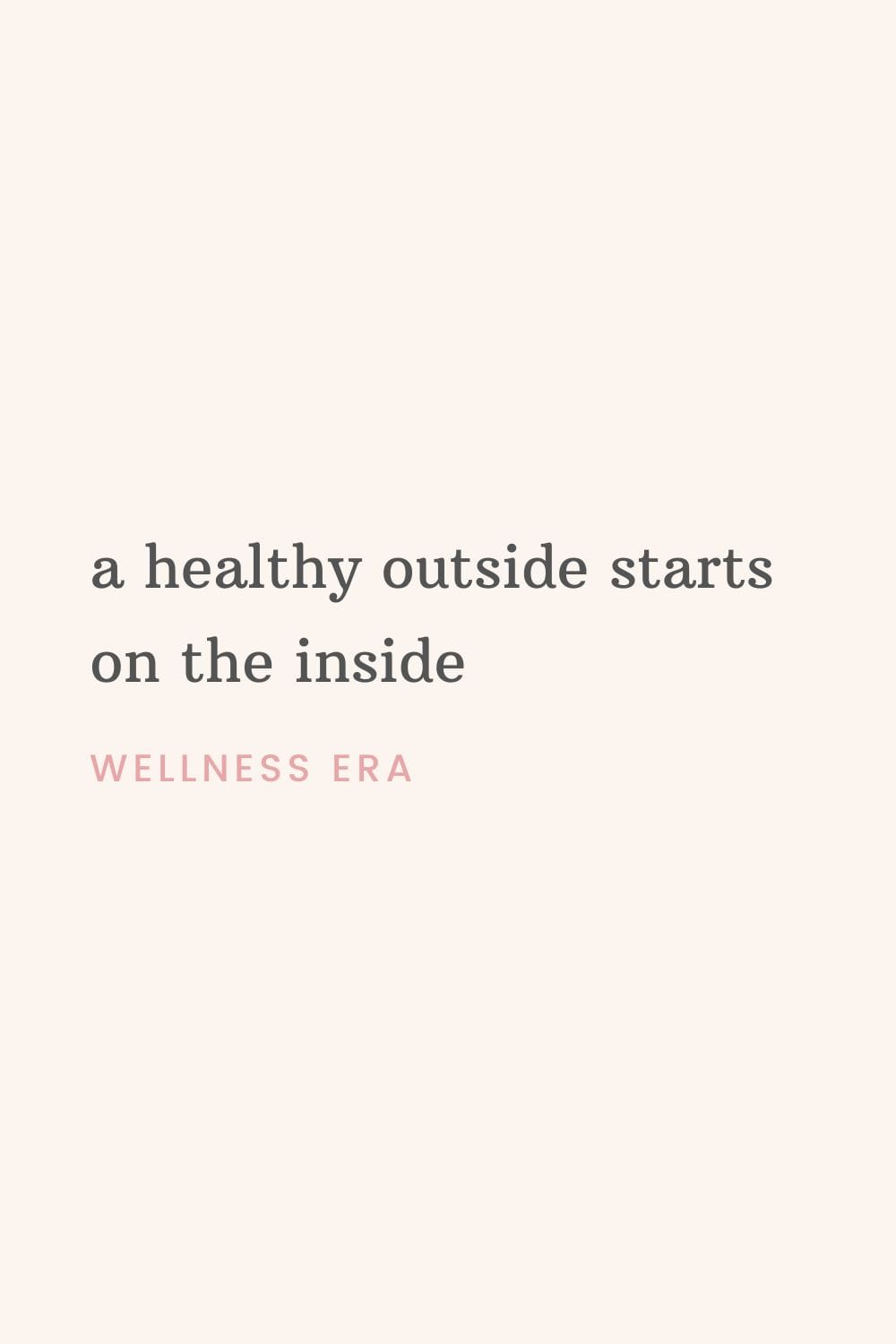
Collagen is the skin’s natural support system—it’s what keeps our skin firm, elastic, and youthful. as we age, these vital proteins face challenges from UV rays, free radicals, and even our own body’s natural slowdown. The result? Fine lines, sagging, and a loss of that youthful glow. Don’t worry, though—nature has your back! With the right natural remedies, you can protect your collagen, support elastin, and give your skin the tools it needs to stay radiant and resilient. Ready to learn how to boost your collagen production and keep aging at bay? Here’s the good news: there are plenty of natural ways to boost your collagen levels and help your skin maintain its resilience and elasticity. Continue and find thse seven powerful, natural solutions for preserving your skin’s youthful vitality!
1. Eat Vitamin C-Rich Foods
Vitamin C is your skin’s best friend when it comes to maintaining firmness, elasticity, and a youthful glow. This essential nutrient plays a crucial role in collagen synthesis, the structural protein responsible for keeping skin firm, joints strong, and bones healthy (Pullar, Carr, and Vissers, 2017).
Vitamin C: The Ultimate Collagen Booster
Vitamin C functions as a cofactor in collagen synthesis by activating enzymes that convert amino acids into structurally stable collagen fibers (Wang et al., 2018). It also regulates genes responsible for collagen production, ensuring efficient skin repair and rejuvenation. Without enough Vitamin C, collagen synthesis weakens, leading to looser skin, fine lines, and increased fragility (Reilly and Lozano, 2021).
Antioxidant Protection for Existing Collagen
Beyond stimulating collagen production, Vitamin C acts as an antioxidant, shielding collagen from free radical damage caused by UV radiation, pollution, and aging (Al-Niaimi and Chiang, 2017). This protective role helps preserve skin elasticity and prevent premature aging.
Bonus? Vitamin C also accelerates wound healing by activating fibroblasts, the cells responsible for repairing damaged tissue, making it an excellent anti-scarring agent (DePhillipo et al., 2018).
How to Get Enough Vitamin C
To ensure optimal collagen production, consume Vitamin C-rich foods like citrus fruits, strawberries, bell peppers, and kiwis. If needed, high-quality supplements can help fill nutritional gaps.
By incorporating Vitamin C into your diet and skincare routine, you support collagen health, strong joints, and vibrant skin—naturally!
Vitamin C isn’t just a collagen booster—it’s also a powerful antioxidant that fights free radicals, preventing premature aging. Dive deeper into how antioxidants protect your skin in our post onFighting Free Radicals with Antioxidants.
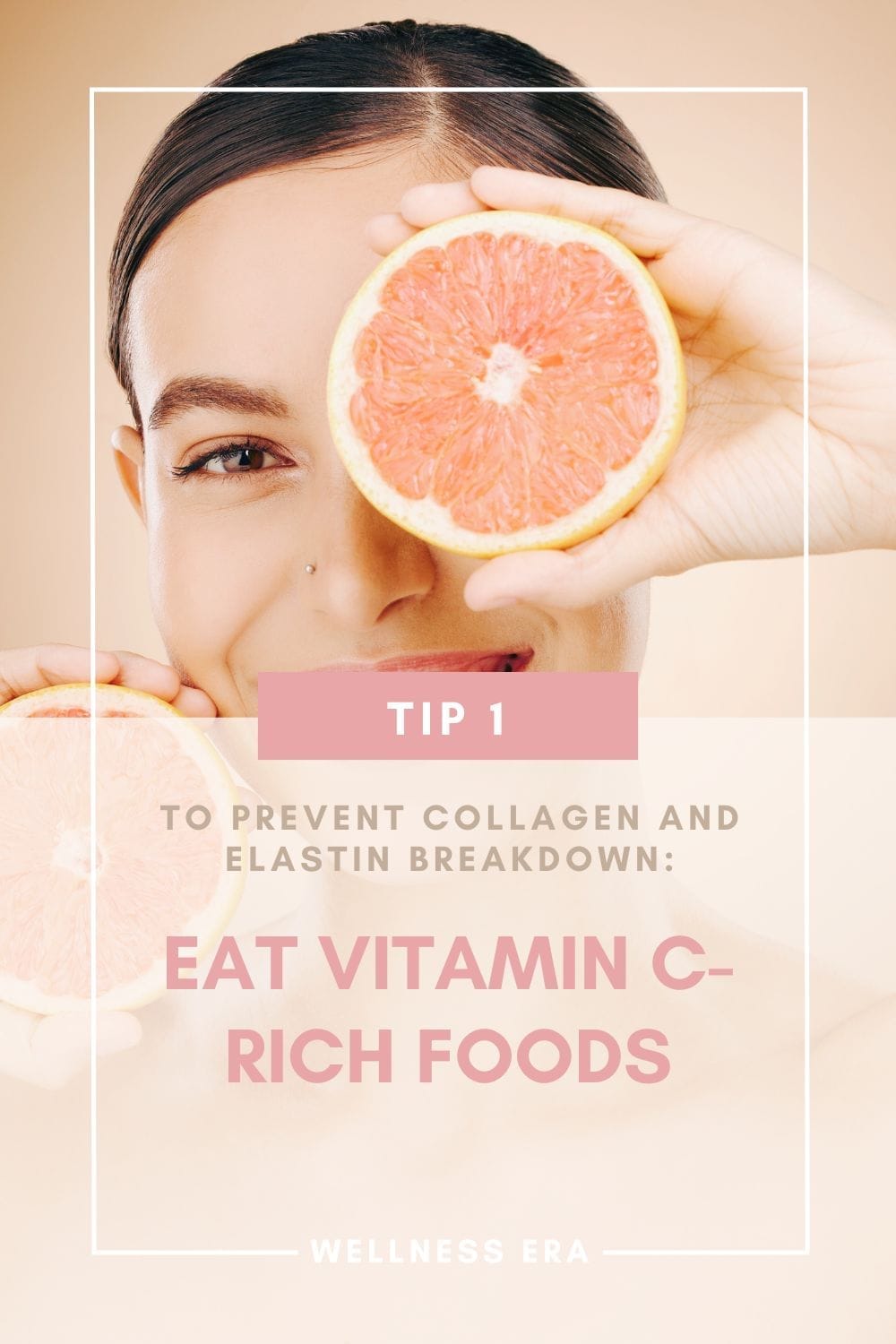
![- [ ] **Vitamin C: The Ultimate Collagen Booster** -**Here’s why Vitamin C is your skin’s best friend:** **Boosts Collagen Production:** - Helps enzymes convert amino acids into collagen—the protein that keeps your skin firm and bouncy. **Protects Existing Collagen:** - Fights collagen-damaging free radicals with antioxidant power, slowing visible signs of aging. **Speeds Up Wound Healing:** - Stimulates tissue-repairing fibroblasts, minimizing scars and promoting smooth, vibrant skin. **Strengthens Joints & Bones:** - Supports collagen’s role in keeping bones and joints sturdy and healthy.](https://d1yei2z3i6k35z.cloudfront.net/9246152/67b6a8c060bcd_Prevent-Collagen-and-Elastin-Breakdown-7-Natural-Remedies-to-Boost-Collagen-Production-73.jpg)
References
Al-Niaimi, F. and Chiang, N.Y.Z. (2017) ‘Topical vitamin C and the skin: Mechanisms of action and clinical applications’, The Journal of Clinical and Aesthetic Dermatology, 10(7), pp. 14–17. Available at: NCBI
DePhillipo, N.N., Aman, Z.S., Kennedy, M.I. et al. (2018) ‘Efficacy of vitamin C supplementation on collagen synthesis and oxidative stress after musculoskeletal injuries: A systematic review’, The American Journal of Sports Medicine, 46(7), pp. 1741–1752. Available at: Sagepub
Reilly, D.M. and Lozano, J. (2021) ‘Skin collagen through the life stages: Importance for skin health and beauty’, OAEPublish, Available at: OaePublish
Pullar, J.M., Carr, A.C. and Vissers, M.C.M. (2017) ‘The roles of vitamin C in skin health’, Nutrients, 9(8), p. 866. Available at: MDPI
Wang, K., Jiang, H., Li, W., Qiang, M., Dong, T. et al. (2018) ‘Role of vitamin C in skin diseases’, Frontiers in Physiology, 9, p. 819. Available at: Frontiersin
2. Consume Protein-Rich Foods
When it comes to maintaining collagen levels, dietary protein and specific amino acids are the building blocks. Collagen, the most abundant protein in the body, is composed of amino acids like glycine, proline, and hydroxyproline, which provide strength and elasticity to skin, joints, and connective tissues (Añazco et al., 2023). Think of dietary protein as the raw material your body uses to weave collagen’s intricate triple-helix structure.
Protein and Amino Acids: Collagen’s Building Blocks
Glycine, the smallest amino acid, plays a critical role in collagen synthesis, making up about one-third of collagen’s structure (Wu et al., 2018). Proline and hydroxyproline are also essential, as they help stabilize collagen fibers and support tissue strength. However, the conversion of proline to hydroxyproline—a vital step in collagen formation—requires Vitamin C, emphasizing the importance of a well-balanced diet (Paul et al., 2019).
Protein-rich foods such as chicken, fish, egg whites, dairy, and legumes provide essential amino acids for collagen production. Additionally, collagen peptide supplements offer a direct source of hydrolyzed collagen, which has been shown to enhance collagen formation in the skin and joints (Holwerda and van Loon, 2022).
How Does It All Come Together?
After consuming protein, the body absorbs amino acids, combines them with cofactors like Vitamin C, and forms procollagen. This precursor is then modified into mature collagen, which reinforces skin structure, enhances elasticity, and promotes wound healing (Deane et al., 2020).
By ensuring a diet rich in high-quality proteins and amino acids, you give your body the nutrients necessary to produce strong, resilient collagen, supporting skin health, joint integrity, and overall wellness—naturally!
Collagen is built from amino acids, and getting enough high-quality protein ensures your body has the raw materials it needs. Explore a holistic approach to nutrition in our guide onWhole Food Nutrition: The Science Behind Eating for Wellness.
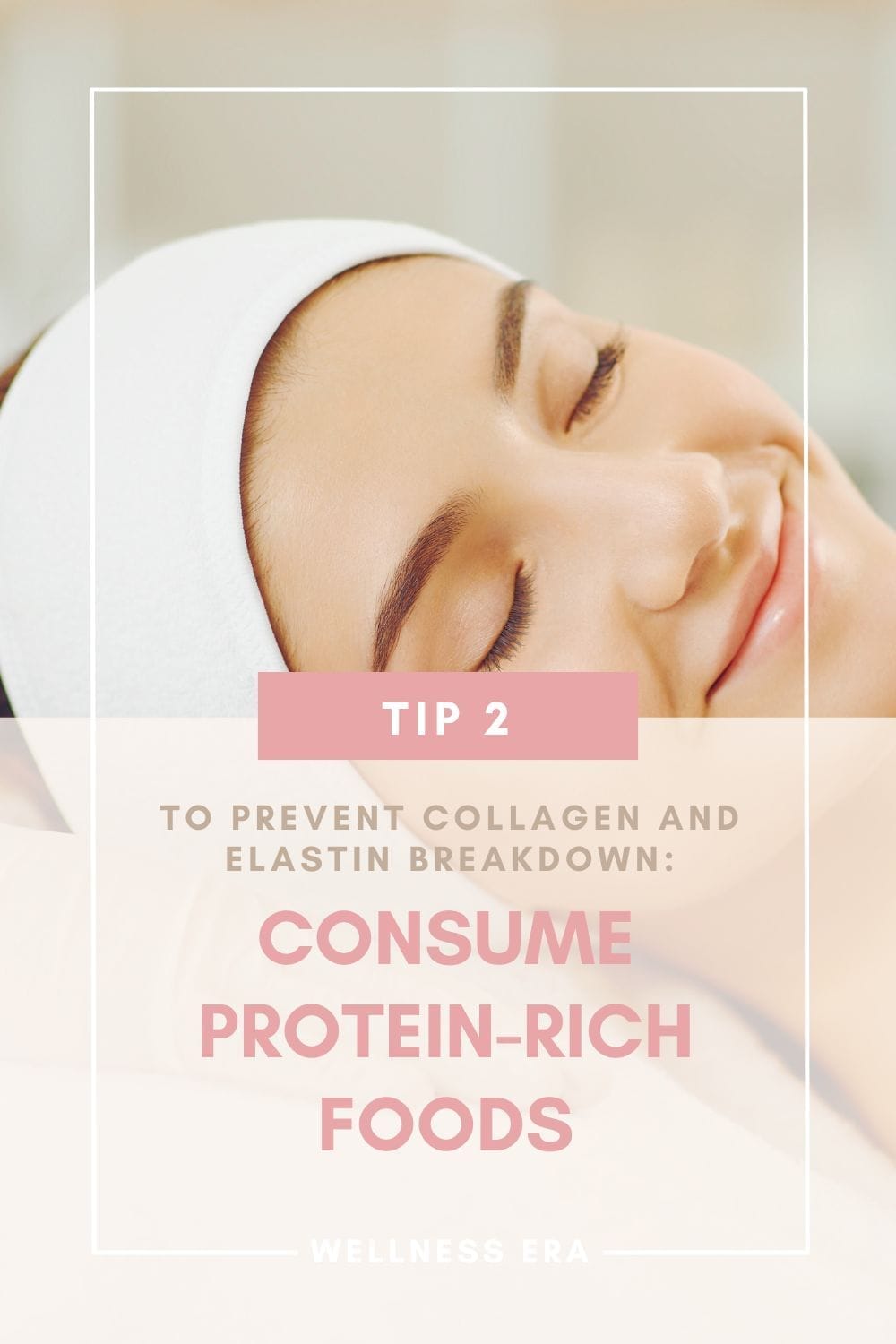
![- [ ] **Protein: Collagen’s Building Blocks** -**Why Protein is Key to Thriving Collagen Levels:** 1. **Supplies Essential Amino Acids:** - **Glycine**: Makes up 1/3 of collagen’s structure, ensuring stability. - **Proline**: Converts into hydroxyproline to fortify collagen strength. 2. **Supports Skin, Joints, & Tissues:** - Protein provides the raw materials for collagen repair and elasticity. 3. **Works Hand-in-Hand with Vitamin C:** - Proline needs Vitamin C to transform into hydroxyproline—don’t skip your citrus!](https://d1yei2z3i6k35z.cloudfront.net/9246152/67b6a8d7a9f1a_Prevent-Collagen-and-Elastin-Breakdown-7-Natural-Remedies-to-Boost-Collagen-Production-75.jpg)
References
Añazco, C., Ojeda, P.G., and Guerrero-Wyss, M. (2023) ‘Common beans as a source of amino acids and cofactors for collagen biosynthesis’, Nutrients, 15(21), p. 4561. Available at: MDPI
Deane, C.S., Bass, J.J., and Phillips, B.E. (2020) ‘Animal, plant, collagen and blended dietary proteins: Effects on musculoskeletal outcomes’, Nutrients, 12(9), p. 2670. Available at: MDPI
Holwerda, A.M., and van Loon, L.J.C. (2022) ‘The impact of collagen protein ingestion on musculoskeletal connective tissue remodeling: A narrative review’, Nutrition Reviews, 80(6), pp. 1497-1512. Available at: Academic Oup
Paul, C., Leser, S., and Oesser, S. (2019) ‘Significant amounts of functional collagen peptides can be incorporated in the diet while maintaining indispensable amino acid balance’, Nutrients, 11(5), p. 1079. Available at: MDPI
Wu, G., and Li, P. (2018) ‘Roles of dietary glycine, proline, and hydroxyproline in collagen synthesis and animal growth’, Amino Acids, 50(1), pp. 29-38. Available at: Springer
3. Consume Antioxidant-Rich Foods
Antioxidants act as bodyguards for your collagen, shielding it from the destructive effects of free radicals that can weaken skin structure. Free radicals—unstable molecules generated by metabolism, UV rays, pollution, and smoking—cause oxidative stress, which breaks down collagen fibers and accelerates wrinkles, sagging, and joint deterioration (Pham-Huy, He, and Pham-Huy, 2008).
Antioxidants: Collagen’s Shield Against Free Radical Damage
Antioxidants neutralize free radicals by donating electrons, effectively halting oxidative stress and protecting collagen integrity (Chen, Hu, and Wang, 2012). Certain vitamins, polyphenols, and carotenoids play essential roles:
Vitamin C boosts collagen synthesis while neutralizing oxidative stress (Pinnell, 2003).
Vitamin E strengthens cell membranes, reducing free radical damage (Zduńska et al., 2018).
Polyphenols in green tea and berries act as natural UV protectors, shielding skin from environmental stressors(Graf, 2010).
Carotenoids, found in carrots and tomatoes, provide photo-protection, preventing collagen degradation from sun exposure (Scapagnini et al., 2011).
The long-term benefits? Smoother, firmer skin, stronger joints, and faster tissue repair—all thanks to antioxidants keeping your collagen intact. So, sip on some green tea, snack on berries, or enjoy a handful of nuts. Your skin will thank you!
Inflammation is one of collagen’s biggest enemies, breaking down its structure and leading to premature aging. Discover how to keep inflammation in check with natural solutions in our post onReducing Inflammation Naturally for Smoother Skin.
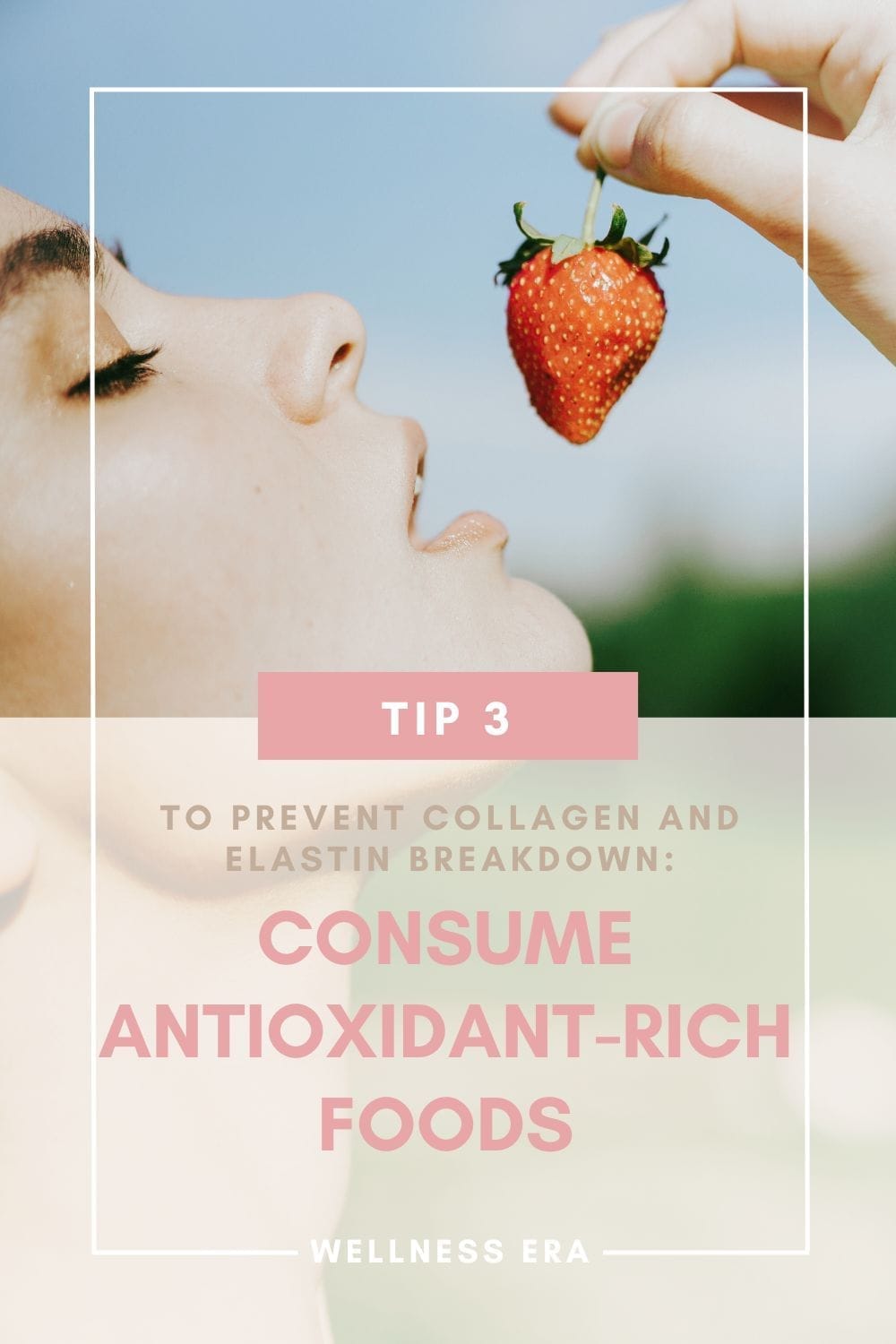
![- [ ] **Antioxidants: Collagen’s Ultimate Defender** - **Why Antioxidants Are Key for Collagen Health:** 1. **Protect Collagen from Free Radicals:** - Defend against UV rays, pollution, and smoking-induced damage. - Halt oxidative stress that weakens collagen bonds. 2. **Boost Collagen Stability:** - Vitamins **C** & **E** neutralize free radicals *and* support collagen production. 3. **Act as UV Shields:** - **Polyphenols** (from green tea & berries) and **carotenoids** (from carrots & tomatoes) protect against environmental stressors.](https://d1yei2z3i6k35z.cloudfront.net/9246152/67b6a8f0ab92f_Prevent-Collagen-and-Elastin-Breakdown-7-Natural-Remedies-to-Boost-Collagen-Production-77.jpg)
References
Chen, L., Hu, J.Y., and Wang, S.Q. (2012) ‘The role of antioxidants in photoprotection: A critical review’, Journal of the American Academy of Dermatology, 67(5), pp. 1013–1024. Available at: ScienceDirect
Graf, J. (2010) ‘Antioxidants and skin care: The essentials’, Plastic and Reconstructive Surgery, 125(4), pp. 144–152. Available at: LWW
Scapagnini, G., Davinelli, S., Drago, F., et al. (2011) ‘Carotenoids as modulators of skin photodamage: molecular and functional aspects’, Archives of Biochemistry and Biophysics, 508(2), pp. 123–129. Available at: ScienceDirect
Pham-Huy, L.A., He, H., and Pham-Huy, C. (2008) ‘Free radicals, antioxidants in disease and health’, International Journal of Biomedical Science, 4(2), pp. 89–96. Available at: NCBI
Pinnell, S.R. (2003) ‘Cutaneous photodamage, oxidative stress, and topical antioxidant protection’, Journal of the American Academy of Dermatology, 48(1), pp. 1–19. Available at: Jaad
Zduńska, K., Dana, A., Kołodziejczak, A., and Rotsztejn, H. (2018) ‘Antioxidant properties of ferulic acid and its possible application’, Skin Pharmacology and Physiology, 31(6), pp. 332–336. Available at: Karger
4. Consume Bone Broth for Collagen
Bone broth isn’t just a comfort food—it’s a collagen powerhouse! Made by simmering animal bones and connective tissues, this nutrient-dense elixir is rich in glycine, proline, and glutamine—essential amino acids for collagen synthesis and tissue repair (Soto-Domínguez et al., 2021). As collagen breaks down during slow cooking, it forms gelatin, a readily absorbable source of amino acids that your body can utilize to rebuild and maintain collagen(Alcock, 2019).
Bone Broth: A Delicious Boost for Collagen Production
Glycine, the most abundant amino acid in bone broth, helps stabilize collagen’s triple-helix structure and supports detoxification (Wu et al., 2018).
Proline works with Vitamin C to form hydroxyproline, a key component that strengthens collagen fibers and enhances skin resilience (Scott and Nordin, 2016).
Glutamine aids in gut lining repair, supporting intestinal health while promoting collagen stability (Campos et al., 2023).
Beyond Skin: Additional Benefits of Bone Broth
The benefits of bone broth extend beyond skin health:
Supports joint mobility by nourishing cartilage.
Strengthens bones with minerals like calcium, phosphorus, and magnesium.
Promotes gut health by repairing the intestinal lining and reducing inflammation.
Whether you sip it as a warm drink or use it as a base for soups and stews, bone broth is a simple and delicious way to naturally fuel your collagen needs.
Collagen thrives in a well-hydrated environment, and bone broth not only provides amino acids but also supports skin moisture. Want to boost hydration naturally? Check out our guide on6 Steps to Hydrate and Combat Dryness of Skin
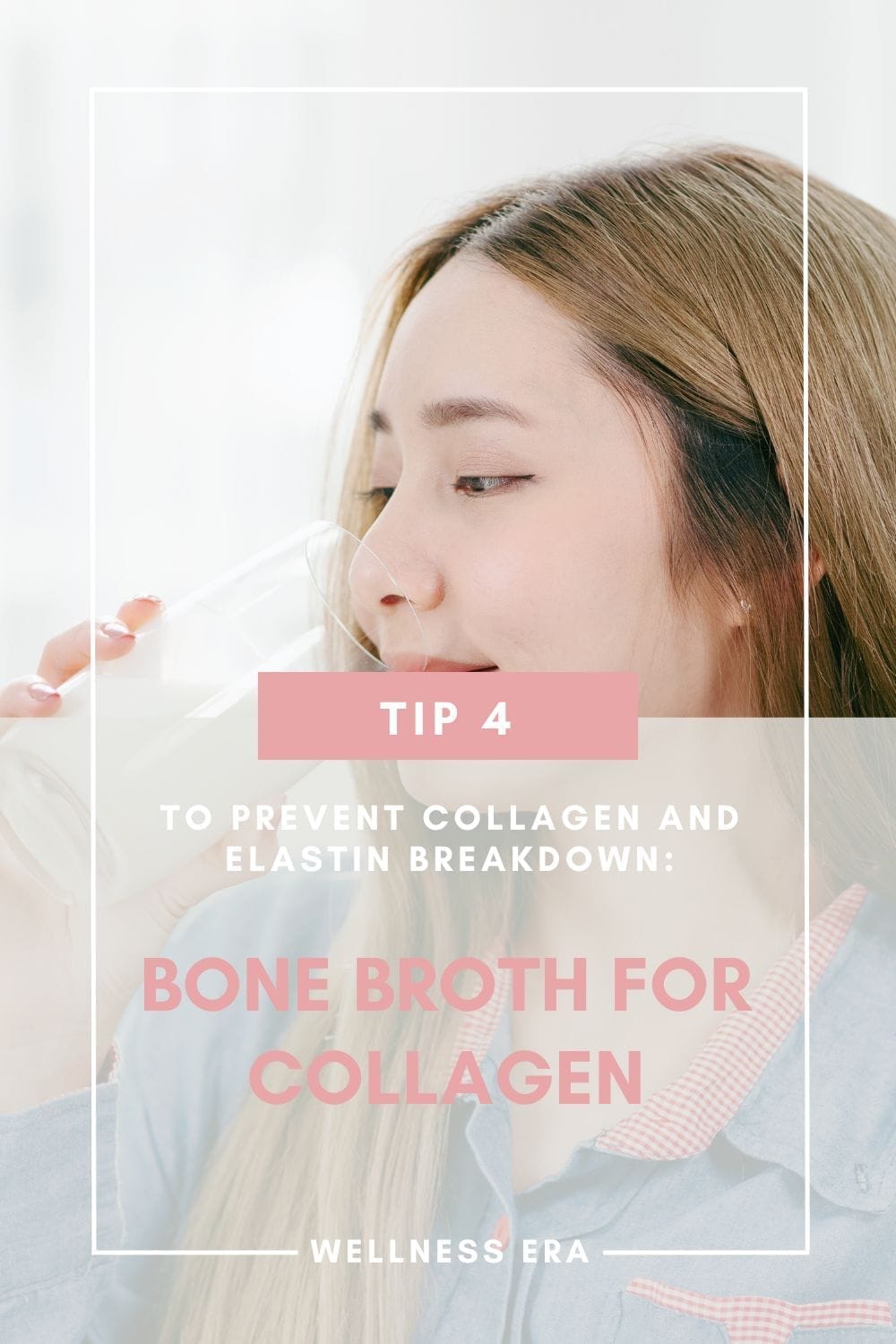
![- [ ] **Bone Broth: Collagen’s Comfort Food** - **Why Bone Broth is a Collagen Powerhouse:** 1. **Packed with Amino Acids:** - **Glycine**: Stabilizes collagen and supports DNA repair. - **Proline**: Works with Vitamin C to strengthen collagen fibers. 2. **Contains Gelatin:** - A highly absorbable form of collagen-building amino acids. 3. **Supports More Than Skin:** - Nourishes cartilage for joint mobility. - Strengthens bones with calcium & magnesium. - Repairs the gut lining for better digestion.](https://d1yei2z3i6k35z.cloudfront.net/9246152/67b6a90739545_Prevent-Collagen-and-Elastin-Breakdown-7-Natural-Remedies-to-Boost-Collagen-Production-79.jpg)
References
Alcock, R.D. (2019) ‘Dietary collagen intake and sources for support of dense connective tissues in athletes’, ACU Research Bank, Available at: Accure
Campos, L.D., de Almeida Pereira, A.T.S., et al. (2023) ‘The collagen market and knowledge, attitudes, and practices of Brazilian consumers regarding collagen ingestion’, Food Research International, Available at: ScienceDirect
Scott, D., and Nordin, B.E.C. (2016) ‘Nutritional factors and bone health’, Journal of Clinical Densitometry, 19(1), pp. 1-10. Available at: ScienceDirect
Soto-Domínguez, A., Rodríguez-Tovar, L.E., Mar-Solís, L.M. et al. (2021) ‘Analysis of the anti-inflammatory capacity of bone broth in a murine model of ulcerative colitis’, Medicina, 57(11), p.1138. Available at: MDPI
Wu, G., and Li, P. (2018) ‘Roles of dietary glycine, proline, and hydroxyproline in collagen synthesis and animal growth’, Amino Acids, 50(1), pp. 29-38. Available at: Springer
5. Apply Topical Vitamin C
Vitamin C isn’t just a nutrient—it’s a cornerstone of healthy, youthful skin. As a cofactor for enzymes like prolyl and lysyl hydroxylase, it stimulates the conversion of amino acids into hydroxyproline and hydroxylysine, which are essential for collagen stability (Pullar, Carr, and Vissers, 2017).
Topical Vitamin C: Nature’s Secret to Boost Collagen
Without sufficient Vitamin C, this process slows down, leading to loss of skin elasticity, fine lines, and wrinkles. Applying Vitamin C topically allows it to bypass dietary absorption limits, delivering its benefits straight to the dermis—where collagen is actively produced.
Vitamin C also works overtime to:
Neutralize free radicals, protecting collagen from oxidative damage (Al-Niaimi and Chiang, 2017).
Inhibit matrix metalloproteinases (MMPs)—enzymes that break down collagen and weaken skin structure (Wang et al., 2018).
Enhance collagen density, reducing the visible signs of aging (Pullar, Carr, and Vissers, 2017).
Vitamin C also works overtime to:
But who needs lab-made serums when nature provides powerful alternatives?
Papaya face masks are loaded with Vitamin C and papain, an enzyme that gently exfoliates dead skin cellswhile boosting collagen production.
Rosehip oil is packed with natural Vitamin C and essential fatty acids, brightening skin and reinforcing the skin’s natural barrier.
Amla powder (Indian gooseberry) is an ancient remedy with one of the highest natural Vitamin C contents, helping to stabilize collagen and improve skin elasticity.Inhibit matrix metalloproteinases (MMPs)—enzymes that break down collagen and weaken skin structure (Wang et al., 2018).
Enhance collagen density, reducing the visible signs of aging (Pullar, Carr, and Vissers, 2017).
With these natural methods, you’re not just nurturing your collagen—you’re giving your skin the tools it needs to stay healthy, resilient, and beautifully radiant. Applying Vitamin C topically helps stimulate collagen production while brightening the skin. Pair it with gentle exfoliation to boost cell renewal—learn how in our post onBoosting Cell Turnover for Brighter Skin.
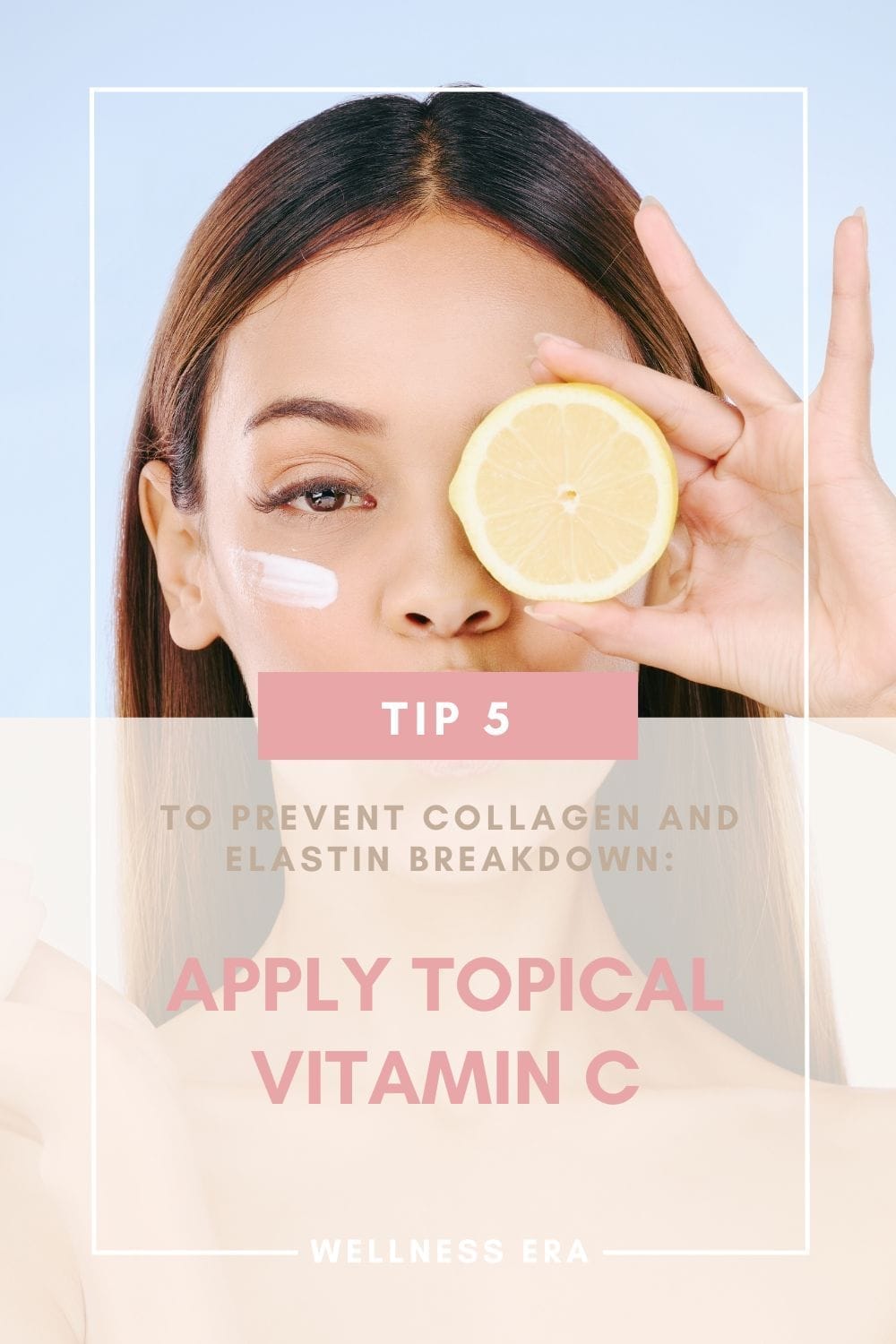
![- [ ] **Topical Vitamin C: Nature’s Collagen Booster** - **Why Vitamin C is a Skincare Essential:** 1. **Boosts Collagen Production:** - Converts amino acids into collagen-building hydroxyproline and hydroxylysine. 2. **Neutralizes Free Radicals:** - Protects skin from damage that weakens collagen. 3. **Targets Wrinkles & Elasticity:** - Delivers Vitamin C straight to the dermis for firmer, smoother skin.](https://d1yei2z3i6k35z.cloudfront.net/9246152/67b6a91f9fafc_Prevent-Collagen-and-Elastin-Breakdown-7-Natural-Remedies-to-Boost-Collagen-Production-81.jpg)
References
Pullar, J.M., Carr, A.C. and Vissers, M.C.M. (2017) ‘The roles of vitamin C in skin health’, Nutrients, 9(8), p. 866. Available at: MDPI
Al-Niaimi, F. and Chiang, N.Y.Z. (2017) ‘Topical vitamin C and the skin: Mechanisms of action and clinical applications’, The Journal of Clinical and Aesthetic Dermatology, 10(7), pp. 14–17. Available at: NCBI
Wang, K., Jiang, H., Li, W., Qiang, M., Dong, T. et al. (2018) ‘Role of vitamin C in skin diseases’, Frontiers in Physiology, 9, p. 819. Available at: Frontiersin
Clemente, C., Ravetti, S., Brignone, S. et al. (2019) ‘Ascorbic acid in skin health’, Cosmetics, 6(4), p. 58. Available at: MDPI
Farris, P.K. (2005) ‘Topical vitamin C: A useful agent for treating photoaging and other dermatologic conditions’, Dermatologic Surgery, 31(7), pp. 814-818. Available at: Wiley
6. Limit high Sun Exposure
Collagen is your skin’s natural support system, keeping it firm, smooth, and resilient. However, excessive UV exposure can rapidly degrade collagen, leading to premature aging. UV-A and UV-B rays penetrate deep into the skin, generating free radicals that activate matrix metalloproteinases (MMPs)—enzymes that break down collagen fibersand inhibit new collagen production (Fisher et al., 2002; Varani et al., 2004). The result? Fine lines, wrinkles, and sagging skin appearing much sooner than expected.
Shielding Your Skin from high UV Rays: A Lifesaver for Collagen
The good news is that you can counteract UV damage with simple, effective habits:
Use broad-spectrum sunscreen: Sunscreen acts as a protective barrier, reducing UV-induced collagen breakdown(Chung et al., 2001).
Wear protective clothing: Wide-brimmed hats, UV-blocking fabrics, and long sleeves provide an additional layer of defense.
Antioxidant-rich skincare: Topical Vitamin C and polyphenols from green tea help neutralize free radicals and protect collagen integrity (Wlaschek et al., 2001).
By giving your skin the protection it needs, you’re not only preserving your collagen but also promoting long-term skin health. So grab that sunscreen and hat—your skin will thank you for it!
UV rays are collagen’s worst enemy, breaking down its fibers and accelerating wrinkles. But there are powerful ways to defend it. Learn how to shield your skin naturally in our guide onProtecting Your Skin from UV Radiation and Environmental Damage.
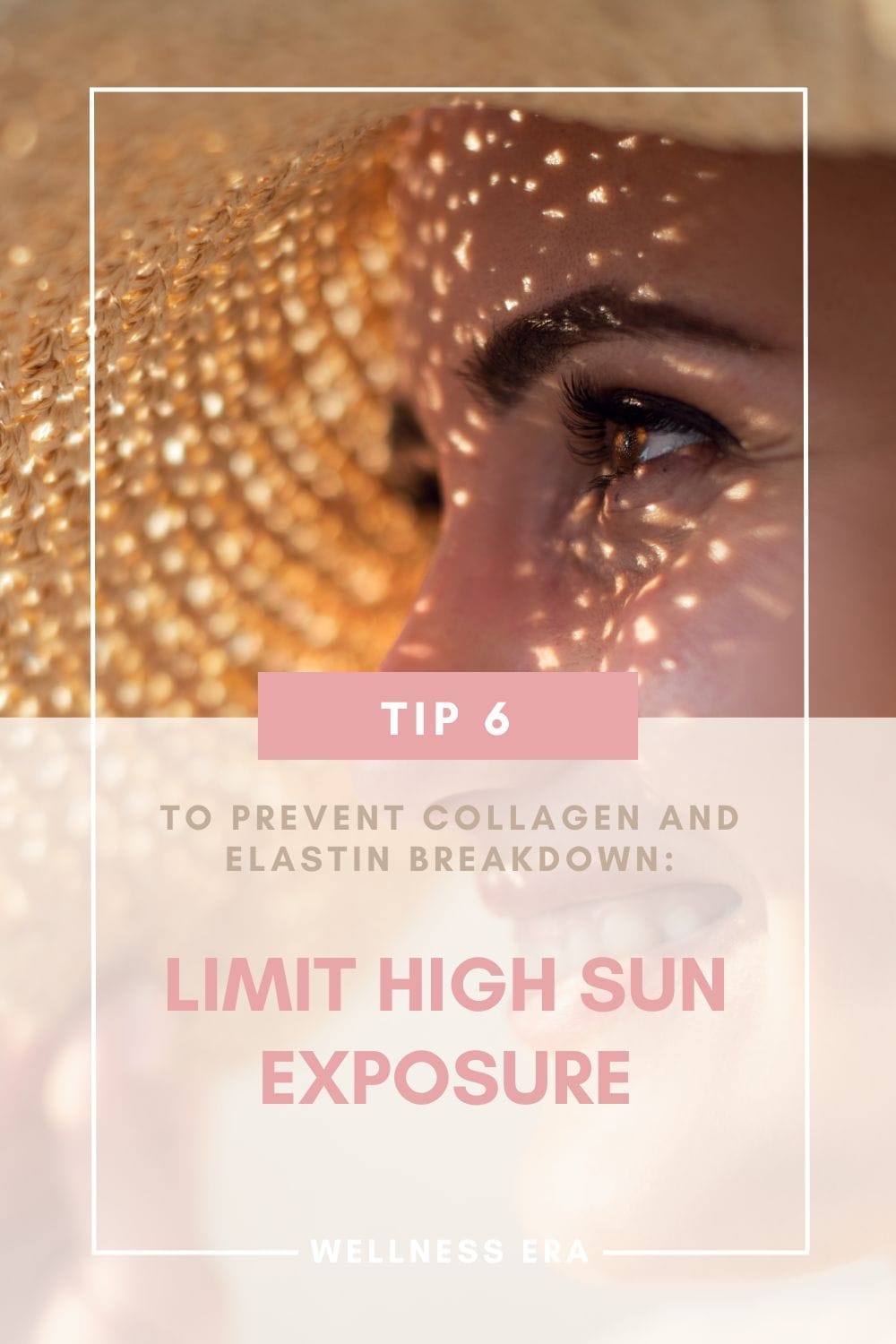
![- [ ] **Protect Your Collagen from UV Damage - Why Shielding Your Skin is Essential:** 1. **Prevents Collagen Breakdown:** - high UV rays activate MMP enzymes that destroy collagen and halt its production. 2. **Fights Photoaging:** - Reduces fine lines, wrinkles, and sagging caused by sun exposure. 3. **Supports Skin Elasticity:** - Keeps your skin firm and smooth for the long haul.](https://d1yei2z3i6k35z.cloudfront.net/9246152/67b6a9372efd3_Prevent-Collagen-and-Elastin-Breakdown-7-Natural-Remedies-to-Boost-Collagen-Production-83.jpg)
References
Fisher, G.J., Wang, Z.Q., Datta, S.C., Varani, J., Kang, S., and Voorhees, J.J. (1997) ‘Pathophysiology of premature skin aging induced by ultraviolet light’, New England Journal of Medicine, 337(20), pp. 1419-1428. Available at: Nejm
Varani, J., Dame, M.K., Rittie, L., Fligiel, S.E.G., Kang, S., and Fisher, G.J. (2004) ‘Decreased collagen production in chronologically aged skin’, American Journal of Pathology, 165(6), pp. 1761-1771. Available at: Amjpathol
Chung, J.H., Seo, J.Y., Choi, H.R., Lee, M.K., and Youn, C.S. (2001) ‘Modulation of skin collagen metabolism in aged and photoaged human skin in vivo’, Journal of Investigative Dermatology, 117(5), pp. 1218-1224. Available at: Sciencedirect
Wlaschek, M., Tantcheva-Poór, I., Naderi, L., Ma, W., and Scharffetter-Kochanek, K. (2001) ‘Solar UV irradiation and dermal photoaging’, Journal of Photochemistry and Photobiology B: Biology, 63(1-3), pp. 41-51. Available at: ScienceDirect
Watson, R.E.B., Gibbs, N.K., Griffiths, C.E.M., and Sherratt, M.J. (2014) ‘Damage to skin extracellular matrix induced by UV exposure’, Antioxidants & Redox Signaling, 21(8), pp. 1063-1077. Available at: ResearchGate
7. Stay Hydrated
Think of hydration as collagen’s closest ally, ensuring it can keep your skin firm, resilient, and glowing. Collagen provides the structural framework for skin, but it functions optimally in a well-hydrated environment, where water interacts with collagen fibers to maintain elasticity and plumpness (Borumand and Sibilla, 2015).
Hydration: The Secret Ally of Your Collagen Network
When skin is properly hydrated, glycosaminoglycans (GAGs)—such as hyaluronic acid—trap water in the extracellular matrix, cushioning collagen fibers and enhancing skin elasticity.
On the flip side, dehydration weakens collagen's support system:
Fine lines deepen, and elasticity fades.
Wrinkles become more pronounced as water loss accelerates collagen breakdown (Kim et al., 2018).
Chronic dehydration can increase oxidative stress, further damaging collagen (Reilly et al., 2024).
How to Hydrate for Optimal Collagen Support
Drink plenty of water throughout the day.
Eat hydrating foods such as cucumbers, watermelon, and celery.
Use humectants like hyaluronic acid in skincare to lock in moisture.
Use a humidifier in dry environments to prevent skin dehydration.
By keeping your body and skin hydrated, you’re not just giving it a temporary glow—you’re strengthening the collagen network for long-term elasticity, firmness, and radiance. Cheers to hydration and all its skin-loving benefits!
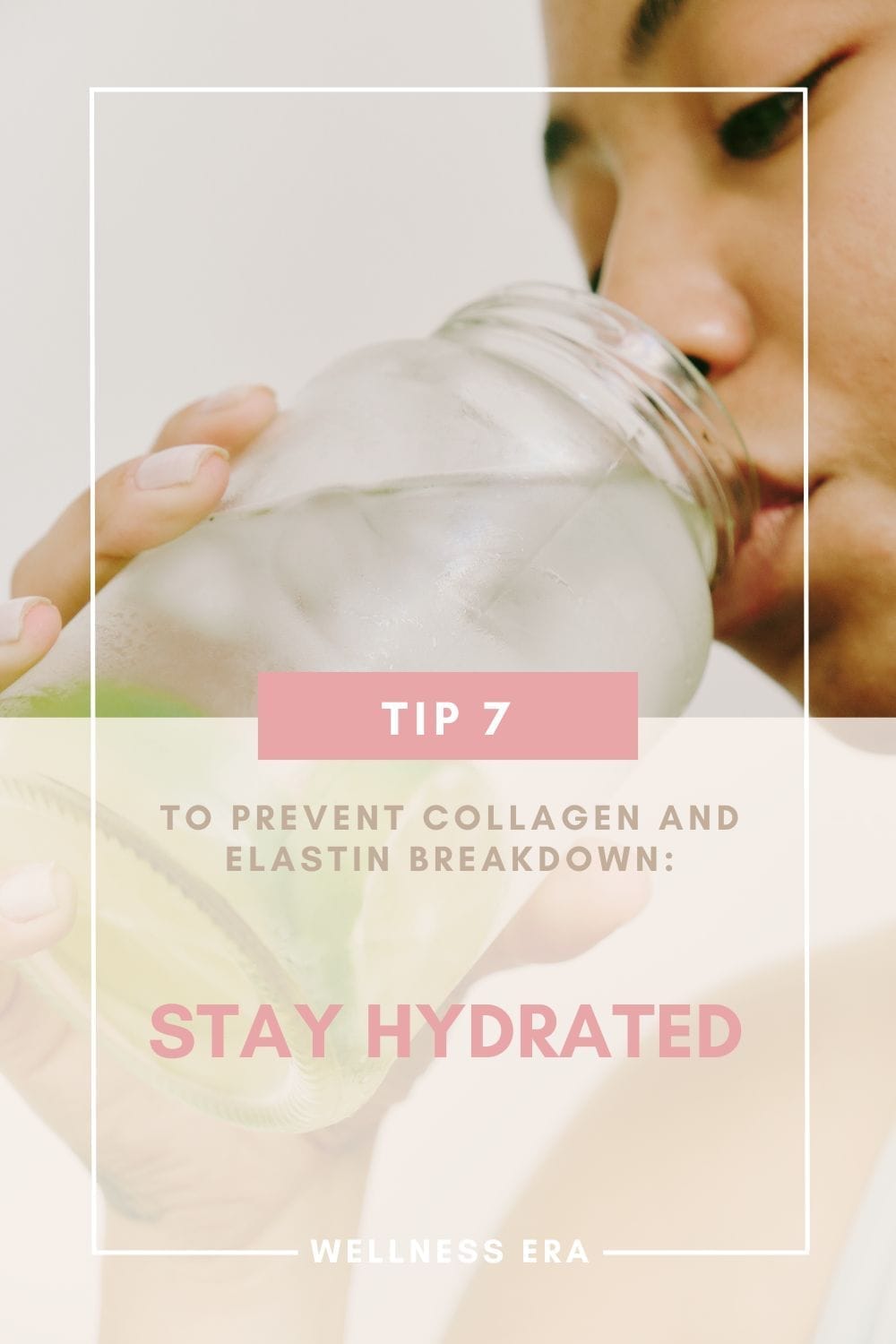
![- [ ] **Hydration: Collagen’s Secret Ally** - **Why Hydration Matters for Collagen:** 1. **Supports Skin Elasticity:** - Keeps collagen fibers cushioned and skin bouncy. 2. **Prevents Fine Lines:** - Well-hydrated skin minimizes wrinkles and boosts resilience. 3. **Slows Collagen Breakdown:** - Dehydration speeds up collagen loss—stay hydrated to protect it!](https://d1yei2z3i6k35z.cloudfront.net/9246152/67b6a954852fb_Prevent-Collagen-and-Elastin-Breakdown-7-Natural-Remedies-to-Boost-Collagen-Production-85.jpg)
References
Borumand, M. and Sibilla, S. (2015) ‘Effects of a nutritional supplement containing collagen peptides on skin elasticity, hydration, and wrinkles’, Journal of Medical Nutrition & Nutraceuticals, Available at: ResearchGate
Kim, D.U., Chung, H.C., Choi, J., Sakai, Y., and Lee, B.Y. (2018) ‘Oral intake of low-molecular-weight collagen peptide improves hydration, elasticity, and wrinkling in human skin: A randomized, double-blind, placebo-controlled study’, Nutrients, 10(7), p. 826. Available at: MDPI
Reilly, D.M., Kynaston, L., Naseem, S., et al. (2024) ‘Improvements in skin collagen, hydration, elasticity, wrinkles, and scalp condition following 12-week oral intake of a supplement containing hydrolyzed collagen’, Dermatology Research and Practice, Available at: Wiley
Voss, W., Bolke, L., Schlippe, G., and Gerß, J. (2019) ‘A collagen supplement improves skin hydration, elasticity, roughness, and density: Results of a randomized, placebo-controlled, blind study’, Nutrients, 11(10), p. 2494. Available at: MDPI
Lin, P., Alexander, R.A., Liang, C.H., et al. (2021) ‘Collagen formula with Djulis for improvement of skin hydration, brightness, texture, crow’s feet, and collagen content: A double‐blind, randomized, placebo‐controlled trial’, Journal of Cosmetic Dermatology, Available at: Wiley
Boosting Collagen Naturally
Your skin’s collagen and elastin are worth protecting—they’re the foundation of your skin’s strength, elasticity, and glow. By incorporating these seven natural remedies into your routine, you’re not just preventing breakdown—you’re actively supporting your skin’s ability to regenerate and thrive. Whether it’s a hydrating glass of bone broth, a nutrient-packed papaya face mask, or a dash of sunscreen for UV protection, every step adds up to healthier, more youthful skin. So start today, embrace these natural methods, and watch as your skin becomes stronger, smoother, and more radiant!
Frequent Asked Questions (FAQs)
What is collagen, and why is it important for skin health?
Collagen is a structural protein that provides strength, elasticity, and hydration to your skin. It’s essential for maintaining firmness, reducing wrinkles, and supporting overall skin health.
What causes collagen and elastin breakdown?
Factors like UV radiation, free radicals, poor hydration, and aging naturally degrade collagen and elastin, leading to sagging skin, wrinkles, and a loss of elasticity.
Learn how to shield your skin from environmental aggressors in our guide onProtecting Your Skin from UV Radiation and Environmental Damage.
Can I naturally boost collagen production?
Yes! You can support collagen production through a nutrient-rich diet, staying hydrated, using Vitamin C-rich skincare, and protecting your skin from UV damage with sunscreen or protective clothing.
Collagen production slows with age, but you can keep it going strong with the right natural remedies. Check outThe Best Natural Remedies for Aging Skinfor effective ways to support youthful, firm skin.
How does bone broth support collagen levels?
Bone broth is rich in amino acids like glycine and proline, which are essential for collagen synthesis. It’s an easy and delicious way to provide your body with the building blocks for healthy collagen.
Can topical remedies help boost collagen?
Absolutely! Natural options like papaya face masks, rosehip oil, and amla powder are packed with Vitamin C and antioxidants that stimulate collagen production and protect your skin from damage.
How can I protect my collagen from UV rays?
Use natural sunscreen, wear protective clothing, and avoid prolonged sun exposure to minimize UV-induced collagen breakdown.
Does hydration really help with collagen?
Yes! Hydrated skin creates an optimal environment for collagen to perform its structural functions. Drinking water and using hydrating products can enhance skin elasticity and firmness.
Collagen needs moisture to stay strong and elastic, and keeping your skin hydrated is essential for preventing premature aging. Discover the best hydration techniques in our guide on6 Steps to Hydrate and Combat Dryness of Skin.
At what age does collagen production start to decline?
Collagen production begins to decline in your late 20s to early 30s, with visible effects often becoming noticeable in your 40s and beyond.
Are collagen supplements effective?
Collagen supplements can help, but natural remedies like bone broth and collagen-rich foods also provide the nutrients your body needs to maintain collagen levels.
Here is something you might also like..
Would you like to receive something special?
Try out the best, inspirational weekly newsletter for your natural wellness era!
My Wellness Era Weekly
SUBSCRIBE TO OUR NEWSLETTER
Your Weekly Dose of Natural Wellness
Fill out the form below, and you will reveice "My Wellness Era Weekly" delivered to your inbox.
What you can expect: a short, warm, and personal note from our founder. Mindset shifts, journal prompts, or self-care reminders. Inspiring quotea related to wellness, mindfulness, or self-love. Small, actionable wellness habits you can try. Recomendations we love, are testing, or recently discovered. Highlights of our latest blog posts.
+++ What we’re loving every single week.
QUICK LINKS
SOCIAL
CATEGORIES



